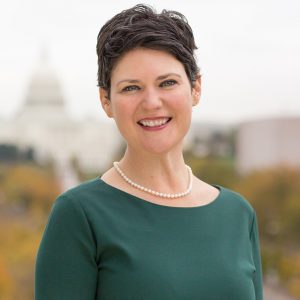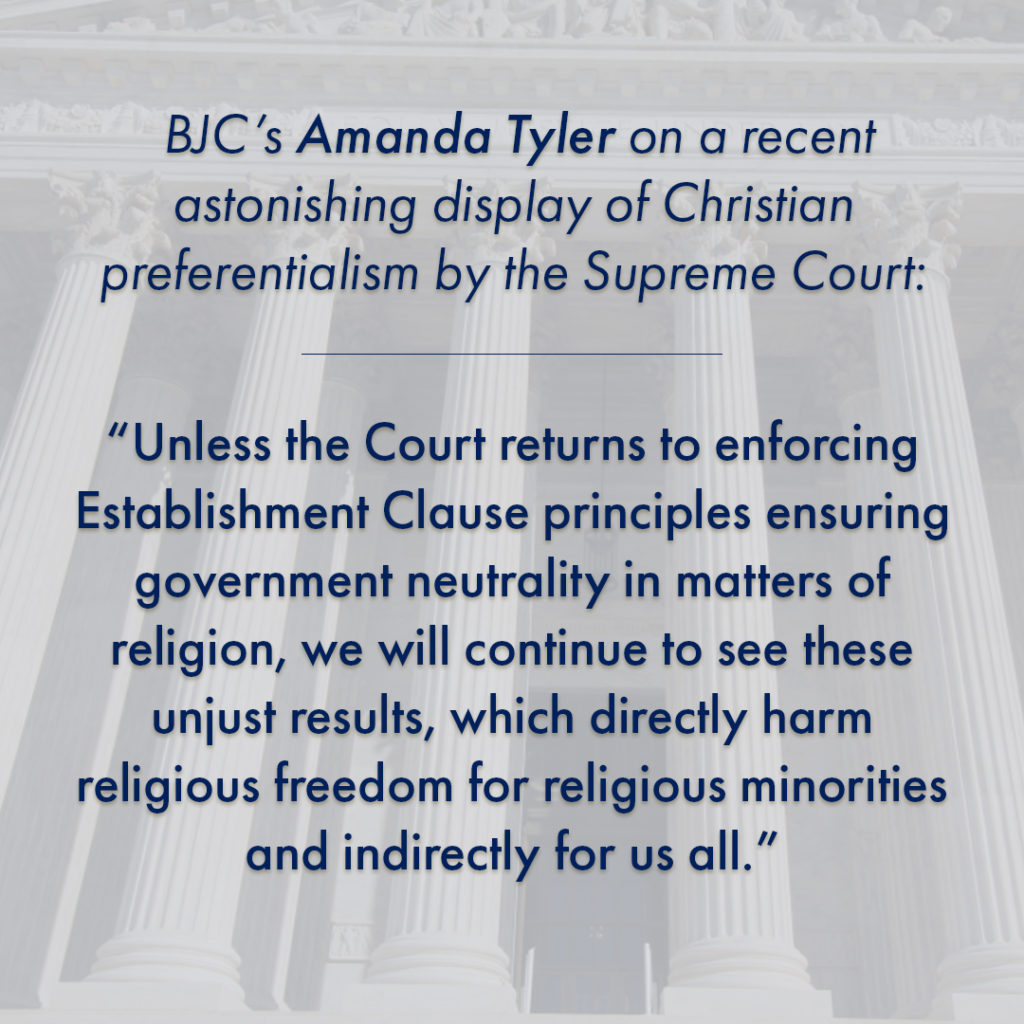
By BJC Executive Director Amanda Tyler
 The first church-state decision of the 2018-2019 Supreme Court term wasn’t a case that BJC or other religious liberty advocacy groups were actively involved in, but one whose effects could reverberate for some time. The case came to the Court on an emergency motion requesting a delay of execution. Press coverage was limited and, as other news these days, fleeting. But those who care about religious liberty in this country need to know about Dunn v. Ray and its astonishing display of Christian preferentialism that threatens everyone’s religious freedom.
The first church-state decision of the 2018-2019 Supreme Court term wasn’t a case that BJC or other religious liberty advocacy groups were actively involved in, but one whose effects could reverberate for some time. The case came to the Court on an emergency motion requesting a delay of execution. Press coverage was limited and, as other news these days, fleeting. But those who care about religious liberty in this country need to know about Dunn v. Ray and its astonishing display of Christian preferentialism that threatens everyone’s religious freedom.
As Supreme Court lawyer Neal Katyal tweeted within hours of the Court’s decision: “100 years from now, law students will read about this decision. It may be read alongside Dred Scott, Plessy v. Ferguson, Korematsu, and the Chinese Exclusion Act cases.”
Domineque Ray was scheduled to be executed by the state of Alabama on February 7 for the 1995 rape and murder of 15-year-old Tiffany Harville. Ray converted to Islam in 2006 and had been meeting with his current imam since 2015. A couple of weeks before his scheduled execution, Ray requested that his imam be present in the death chamber with him and that the Christian chaplain – who was a prison employee – be excluded. Both requests were denied, and Ray’s lawyers sought relief for him. The U.S. Court of Appeals for the 11th Circuit granted his request to delay the execution, finding that the prison’s decision to exclude Ray’s spiritual adviser likely violated the First Amendment’s guarantee of religious freedom. But, when the appeal reached the Supreme Court, the justices quickly ruled that the execution could go forward as planned without considering the claim, issuing its decision within hours of getting the appeal. Justice Elena Kagan wrote a passionate opinion for the four justices dissenting from the Court’s decision, calling it “profoundly wrong.”
The procedure involved in death penalty appeal cases is famously complex and almost always results in decisions against the condemned inmate. Constitutional lawyers know this reality and yet were uniformly astounded by the cruelty of the result. For the state to deny access to one’s spiritual adviser at the moment of death carried out by the state seems to have a crossed a line for a decent civilization.
But, does it also cross a constitutional line? I agree with many church-state lawyers that it does. Religious freedom is protected by the First Amendment – specifically its first 16 words: “Congress shall make no law respecting an establishment of religion, or prohibiting the free exercise thereof.” The first clause – the Establishment Clause – provides that government must remain neutral in matters of religion, not showing a preference for one religion over another. And the latter clause – the Free Exercise Clause – protects one’s right to believe and also to practice one’s faith. Neither principle is absolute, but the clauses work together to protect religious freedom for a religiously diverse people.
To be sure, protecting religious freedom in prisons, where the state is charged to deny personal freedom, presents unique challenges. Congress recognized the need to be particularly concerned with prisoners’ free exercise rights when it passed the Religious Land Use and Institutionalized Persons Act of 2000 (RLUIPA). But RLUIPA, which provides even more protection for free exercise than the U.S. Constitution, failed to help here, apparently because Ray’s lawyers did not plainly argue that to deny Ray’s request for his spiritual adviser to be present at death was a substantial burden on his religious exercise.
That’s where the other half of our constitutional protection – the Establishment Clause – could have produced a different, more humane, result. The state of Alabama had already designed a system that allowed for a Christian chaplain to be present to minister to the inmate in his or her last hours, lifting a burden on religious exercise. But of course, that system also implicitly assumes that the person will need a Christian minister. As the Court of Appeals decision succinctly stated, “If Ray were a Christian, he would have a profound benefit; because he is a Muslim, he is denied that benefit.” At the 11th hour, while still denying his request for an imam to be in the room, the state granted Ray’s request to exclude the Christian chaplain. This attempted fix did nothing to protect Ray’s religious freedom rights and instead tried to erase the Christian supremacy inherent in the original policy.
Beyond the irreversible wrong to Ray, who was executed on February 7 without his spiritual adviser at his side, this decision damages religious freedom. The case is another that can be cited by those who rightly observe two rules for religious liberty in this country – one for Christians, and one for everyone else. Unless the Court returns to enforcing Establishment Clause principles ensuring government neutrality in matters of religion, we will continue to see these unjust results, which directly harm religious freedom for religious minorities and indirectly for us all.
A version of this column appears in the Spring 2019 edition of Report from the Capital. You can download the magazine as a PDF or read a digital edition.





